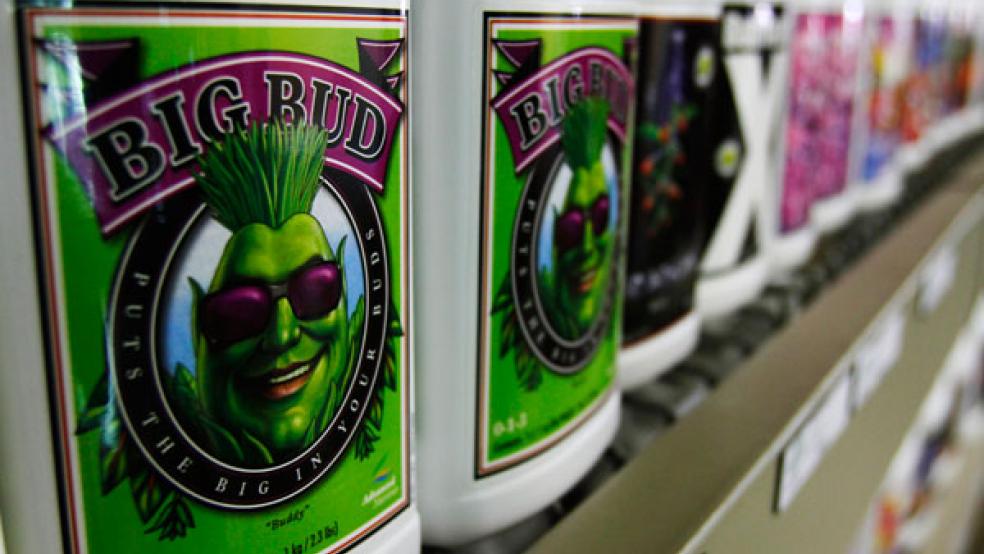An air carrier is veering into a product-pitching space long dominated by late-night, fast-foodies, hinting at legalized marijuana while beckoning flyers to "get mile high."
Spirit Airlines, playing off the approved use and sale of cannabis in the Rocky Mountain State, dangles discounted fares to Colorado where, its ad informs, "the no smoking sign is off," nudging the content needle inside a sales niche called marijuana marketing.
Related: Legalizing Pot Makes Mexican Cartels Even More Dangerous
The tactic has been delicately plied by other brands, including Taco Bell, Jack in the Box, Denny's and Carl's Jr. They have run ads intimating weed use, with code words like "munchies" or "bake," or with squinty-eyed characters engaged in apparent stoner babble.
But Spirit transports passengers through the sky from city to city, not gorditas from a drive-through window to a car. Should an airline mix pot and planes in its consumer messaging?
"Spirit operates in a cutthroat business. They get outshouted by the bigger brands so they have to make their marketing dollars work harder and go further. And the message needs to be disruptive," said Simon Williams, founder and CEO of Sterling Brands, a brand consultancy with clients that include Google, Disney and Visa.
Related: Study Finds Link Between Teen Pot Use and Schizophrenia
"One of the most effective ways of doing that is courting controversy. Another way is being irreverent. They appear to be doing both and adding some humor in the process," Williams added. "As long as Spirit is not alienating its core target, I think that the current messaging is fine."
With two states (Colorado and Washington) having legalized adult cannabis use and 21 states having sanctioned some form of medical marijuana, the number of mainstream companies that sprinkle a bit of pot into their TV pitches will only grow, predicted Timothy Calkins, a clinical professor of marketing at Northwestern University's Kellogg School of Management.
"Many brands in this country aren't going anywhere near the legalization issue. For most brands, that's very smart," Calkins said. "Some brands, though, can push this. We're going to see more brands take advantage of this and use this as a way to define themselves."
"Spirit Airlines has a certain character and, as a result, I think this works for Spirit," Calkins added. "But we're not going to see United (Airlines) embrace the same idea anytime soon."
So far, no mainstream companies that dabble in weed marketing overtly use the word "marijuana" in their ads. Then again, those same companies are unwilling to use any words when asked to explain the commercials: Calls and emails by CNBC seeking comment from Spirit, Taco Bell, Jack in the Box, Denny's and Carl's Jr., went unreturned.
Related: Why Legalizing Marijuana Is a Smart Fiscal Move
As for Spirit, one business-image expert suspects the company simply may need to remain mum about its double entendre ad, which includes the tagline: "Fares so low they're barely legal in some states."
While the U.S. Justice Department decided Aug. 29 not to intervene in Colorado or Washington—where state marijuana laws on sales and use now conflict with federal laws—other D.C. agencies, like the Federal Aviation Administration, could seek to curb the current Spirit blitz, said Robert Dilenschneider, founder and principal of the Dilenschneider Group, which works with corporations on communications and crisis management.
"If this (campaign) continues in any way, Spirit will have a regulatory issue to deal with. Air space is controlled by different governing bodies in the U.S. and it won't be long before legal and regulatory forces exert themselves," Dilenschneider said via email. "The FAA will likely intervene and halt the campaign because it violates regulatory standards."
Whether the FAA, the Federal Communications Commission or any government entity ultimately takes that sort of stand remains to be seen. But opponents of marijuana legalization assert that Spirit and the quick-serve food companies targeting the cannabis crowd soon will hear a consumer outcry.
"It's just part of trying to climb on the bandwagon of being edgy and trying to be cool to get a certain demographic. But most people will put two and two together and realize they don't want a company they rely on for safety, glamorizing and normalizing something that directly would result in an accident," said Kevin Sabet, a co-founder of Project SAM (Smart Approaches to Marijuana). "I'm not sure it's best practice for an airline. And if you really think about it, it's unbelievable."
All of the marijuana-tinged ads will, in time, eventually lure more pot proponents to the anti-legalization side of the argument, Sabet projected.
"Parents who may not have taken interest in the debate before all of the sudden want to take interest (when they see these TV commercials)," Sabet said. "They're realizing it's not what they voted for or what they bargained for. So I think it's a very risky move for the companies that use advertising. They risk a backlash."
This article originally appeared in CNBC.
Read more at CNBC:
How cannabis could be the next great U.S. industry
Colorado's brand-new pot economy
New marijuana laws spark buzz among brewers




